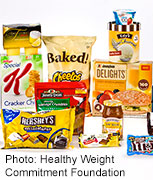- Double Mastectomy May Offer No Survival Benefit to Women With Breast Cancer
- Toxic Lead Found in Cinnamon Product, FDA Says
- Certain Abbott Blood Sugar Monitors May Give Incorrect Readings
- Athletes Can Expect High Ozone, Pollen Counts for Paris Olympics
- Fake Oxycontin Pills Widespread and Potentially Deadly: Report
- Shingles Vaccine Could Lower Dementia Risk
- Your Odds for Accidental Gun Death Rise Greatly in Certain States
- Kids From Poorer Families Less Likely to Survive Cancer
- Tough Workouts Won’t Trigger Cardiac Arrest in Folks With Long QT Syndrome
- At-Home Colon Cancer Test Can Save Lives
Food Companies Cut 6.4 Trillion Calories From Supermarket Shelves: Report


Major food companies are keeping their word by removing 6.4 trillion calories from the U.S. marketplace in an effort to promote healthy weight, a new report says.
The report, funded by the Robert Wood Johnson Foundation (RWJF), a respected nonprofit group, evaluated the pledge made by 16 major food companies to remove 1 trillion calories from the marketplace by 2012 and 1.5 trillion calories by 2015. So far, the companies have topped their 2015 pledge by more than 400 percent.
“This is good for the American people by helping to reduce the obesity epidemic,” said Dr. James Marks, senior vice president and director of the health group at RWJF.
The companies were able to reduce calories by reformulating products, developing new products and repackaging products to make the portions smaller, he said.
Some of these products are Hershey’s Miniatures, Coca-Cola Zero, Pepsi Next, Special K Cracker Chips, Keebler Mini Fudge Stripes and Ball Park Lean Beef Franks.
Marks said he thinks public desire for healthier products also played a role by making it attractive for these companies to produce lower-calorie products.
These changes were also good business, Marks said. The food industry saw an opportunity to attach itself to a growing trend toward healthier foods, he said. Reducing calories was a way to capitalize on that trend and gain market share and increase profits — “the dynamics of the marketplace,” he said.
“The net effect was this reduction,” Marks said. “They committed to a reduction and were willing to be held publicly accountable.”
To remove calories from the marketplace, the companies formed the Healthy Weight Commitment Foundation in 2009.
In 2007, the 16 companies sold 60.4 trillion calories, which provided the baseline for their pledge. In 2012, they sold 54 trillion calories. This 6.4 trillion calorie reduction means that, on average, every person in the United States is consuming 78 fewer calories each day, according to the RWJF report.
Some of the companies that made the pledge are Bumble Bee Foods, Campbell Soup Company and the Coca-Cola Company.
“We are excited about this report because we have exceeded our goals,” said Lisa Gable, president of the Healthy Weight Commitment Foundation. “This really speaks to the competitive nature of this market,” she added.
For his part, Marks said he hopes this effort will reach beyond these 16 companies and that others will get on board with the program and start reducing calories in their products.
Nutrition experts said it’s not yet clear what long-term effect the calorie cuts will have on health.
“This is a step in the right direction toward changing our food environment. Only time will tell just how much of an impact it might have on American waistlines,” said Lona Sandon, an assistant professor of clinical nutrition at the University of Texas Southwestern Medical Center at Dallas.
“It is good to see the food industry working together to help people make healthier choices,” she said.
Samantha Heller, a senior clinical nutritionist at the NYU Langone Medical Center in New York City, cautioned that calories are only one factor when it comes to eating a healthful diet.
“Let’s remember that health is a complex process and is not just about calories,” Heller said. “Consuming fewer calories will help with weight management, but how have the changes food companies made to their products affected the salt, fiber, chemical additives and preservatives or artificial sweetener content of the foods?” she added.
“Better-for-you-foods seem to be trending now. ‘Better than what?’ I might ask. I hope they really are healthy-for-you-foods that everyone can enjoy as part of an overall healthy diet,” Heller said.
Of the 40 companies that founded the Healthy Weight Commitment Foundation in 2009, 16 took the pledge, according to an RWJF news release.
These 16 companies, however, accounted for 36 percent of the calories in all packaged foods and drinks sold in the United States in 2007, the news release noted. Their products include cereals, snacks, canned soups and bottled drinks.
Dr. David Katz, director of the Yale University Prevention Research Center, also took issue with focusing only on calories and not quality.
“Reducing calories sold is not the same as improving the overall quality of foods and the diet. The evidence is overwhelming that good foods making up good diets can exert an enormous influence on health,” Katz said.
“If a reduction in calories sold and consumed is joined with improvements in nutritional quality, and both trends are sustained, the public health will certainly improve. I am hopeful that will occur, but we are not there yet,” he noted.
Gable responded that lowering calories also reduces those additives that nutritionists are worried about.
“When you reduce calories you also reduce a variety of things like sugars and fats,” she said. “Calories is the common denominator amongst all the products. So we made a decision that we were going to focus on calories so that we could really capture all the capabilities of the product lines of the 16 food and beverage companies.”
Not only did these companies reduce calories, they also improved their financial performance, Gable said. “Between 2007 and 2011, lower-calorie products accounted for 82 percent of sales growth, which is really significant,” she said.
Other companies committed to the calorie-reduction pledge are ConAgra Foods (includes Ralston Foods); General Mills, Inc.; Hillshire Brands (previously Sara Lee Corporation); Kellogg Company; Kraft Foods Group/Mondelez; Mars, Incorporated; McCormick & Company, Inc.; Nestle USA; PepsiCo, Inc.; Post Foods; the Hershey Company; the J.M. Smucker Company; and Unilever.
The study was done by researchers at the University of North Carolina at Chapel Hill, who expect to publish their full study later in the year.
More information
For advice on healthy nutrition, visit the Harvard School of Public Health.
Source: HealthDay
Copyright © 2024 HealthDay. All rights reserved.










